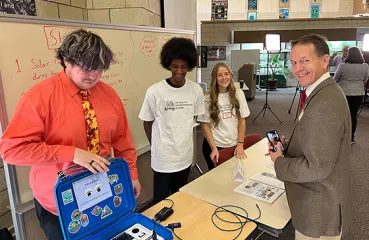Macalester College was the only higher education institution of 17 grantees to be awarded as part of the Battery Recycling, Reprocessing, and Battery Collection Funding through the U.S. Department of Energy. Their $1.77 million grant is part of the broader program to increase consumer participation in battery recycling programs, improve the economics of consumer battery recycling, and help establish state and local collection programs. We spoke with Dr. Roopali Phadke, professor of environmental studies at Macalester to learn more.
We encourage reuse and republishing of this story. All Clean Energy Resource Teams stories are made available under the Creative Commons Attribution license, meaning you can share and adapt the work as long as you give us credit. We'd also love it if you link back to the original piece. Have questions or want to chat? Drop us a line.



